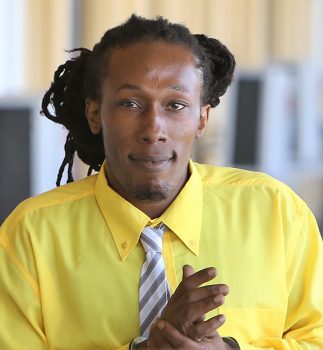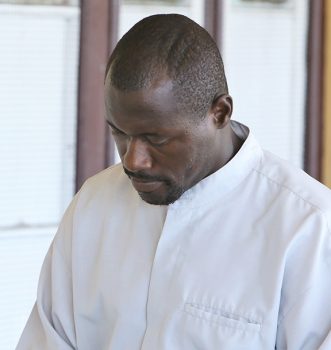Escaped Bartica massacre convict Mark Royden Williams, called “Smallie,” and his co-accused Dennis Williams, called “Anaconda,” who were both sentenced to death, had appealed their convictions earlier this year.
Mark Royden is currently on the run, after escaping the Camp Street Prison, which was gutted by fire on Sunday afternoon. He is said to be the mastermind of an elaborate jailbreak plot.
In February, a jury unanimously found the men guilty of storming Bartica, where 12 men, including three police officers, were killed during an almost hour-long assault. Those killed in the rampage, were police officers Lance Corporal Zaheer Zakir, and Constables Shane Fredericks and Ron Osborne, and civilians Edwin Gilkes, Dexter Adrian, Irving Ferreira, Deonarine Singh, Ronald Gomes, Ashraf Khan, Abdool Yasseen, Errol Thomas, and Baldeo Singh.
In their notices of appeal, filed on February 16, about two weeks after their convictions, both convicts contended that their trials were unfair and that the court had no jurisdiction to hear their matters.

For his part, Mark Royden argued that trial judge, Justice Roxane George, did not have the jurisdiction to hear his case. The Appellant, through his attorney Roger Yearwood, is claiming a breach of his constitutional right guaranteed by Article 144 (2) to be present at every stage of his trial.
According to him, his right was contravened when former acting Chief Justice Yonette Cummings-Edwards, in a motion filed by the Director of Public Prosecutions (DPP), ordered in his absence, that the trial be moved from the county of Essequibo to Demerara, without him being afforded a right to be heard.

The appellant advanced, too, that Justice George continued the breach when, though herself initially ruling that his right to be heard had been violated and that the court had no jurisdiction to hear the trial, she later recalled her own ruling by presiding over the case on order from the Chief Justice.
Additionally, Mark Royden argued that Justice George erred in law in seeking to recall her ruling that she had no jurisdiction to hear his matter, in that she became functus at the time of her initial ruling and was thereby sitting on appeal from her own order.
Another ground on which he is appealing is that the judge erred in law in her directions to the jury regarding breaches of police standing orders by officers who conducted the identification parade at which he was purportedly identified.
He contended that the jury was directed “that the standing orders did not have the force of law, thereby insinuating and suggesting that breaches of those orders were non-consequential.”
According to the appellant, the judge also erred in law in misdirecting the jury and/or failing to adequately direct it, regarding the weakness of the evidence of identification by a witness, who at the trial testified to identifying an “Amerindian looking man with a long face” and “slim built,” but in his statement to the police given three days after the incident, purported to have identified the person he claimed to be the appellant as “an Amerindian looking man” with a “round face” and “stocky built.”
Joint enterprise
Among the other grounds on which the convict is appealing his conviction is that the trial judge misdirected the jury in relation to the issue of joint enterprise, accomplices, and how they ought to have treated with the evidence of witnesses Dwane Williams, Clebert Reece and Michael Caesar.
Dennis Williams, meanwhile, through his attorney Saphier Hussain, said among other things, that Justice George “was wrong in law to continue the trial in his absence and in the absence of a Counsel of his choice.”
When the trial was almost at an end, however, it was Dennis who refused to attend court. Whenever the judge would enquire from prison officials the reason for his absence, the court was repeatedly informed that Williams had said he would not be returning to court.
Meanwhile, Hussain, who is listed as counsel in the appeal, was also Williams’ attorney during the High Court trial. Just about the time his client stopped attending court, Hussain told the judge that Williams no longer wanted his representation.
Justice George had said that while the court appreciated Hussain’s explanation that Williams had discharged him, the then Chief Justice had ordered, and she concurred, that he (Hussain) be state-assigned as counsel.
At this stage, Hussain said he would be appearing “under protest.”
Justice George had noted that in light of Dennis Williams’ refusal to attend or communicate with the court, it would have been unfair to his then co-accused, for the proceedings to be stalled, as the case was nearing its end.
Among the grounds for appeal by Dennis, however, through trial attorney Hussain, who is also listed as his appeal attorney, is that Justice George wrongfully reassigned the said Hussain to continue trial under protest, after Williams had discharged him.
The appellant is contending, too, that the judge wrongfully refused Hussain leave to withdraw his appearance from the matter.
Listed as a ground for appeal by Dennis, also, was that he was denied representation by a counsel of his choice when Justice George acted in breach of natural justice, by repeatedly requiring Hussain “to sit down.”
Dennis Williams is also contending that the judge erred in law by refusing to recuse herself from the trial, given that before the trial, she had taken guilty pleas for manslaughter from Reece and Caesar and in passing sentence, had made “adverse comments” on the matter in which the men were called as witnesses.
This appellant, too, contended that Justice George had no jurisdiction to hear his matter.
According to Dennis Williams, the judge erred in law when she upheld Justice Cummings-Edward’s order contrary to principles of natural justice, to have the case transferred from Essequibo to Georgetown without him being given a hearing.
Reece was called as a witness for the prosecution, while his cousin, Caesar, was called as a witness by the defence.
Dennis also asserted, among other things, that the trial judge admitted hearsay evidence of surveillance and intelligence as stated by a police witness, and failed to give proper directions to the jury regarding the said evidence.
Both convicts said that the judge did not fairly put their defence to the jury.
On February 2, the convicts were read the death sentence by Justice George, after a jury found them guilty of seven and eight of the 12 murders, respectively. They were convicted of manslaughter for the other killings, as the evidence led during the trial was that now dead infamous gang leader Rondell “Fine Man” Rawlins had himself executed five of the murdered 12.
On the lesser charge, Mark Royden and Dennis, were each handed down life sentences.
A third person, Roger “Goat Man” Simon, who was also indicted with Mark Royden and Dennis, was acquitted by the jury, of all charges.
Cousins; Reece, called “Chi Chi” and Caesar, called “Capone,” were each sentenced late last year to 35 and 60 years in jail, respectively, after pleading guilty to the lesser count of manslaughter for their roles in the Bartica killings.
Self-confessed gang member Dwane Williams, had detailed the gang’s plans, movement and its execution of the deadly attack at Bartica.
Dwane, called “Small Fren,” was recruited by “Fine Man” whom he said he knew from growing up in the village of Buxton, at the age of 15. The young man was arrested in connection with the Bartica massacre, but was never charged.









